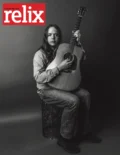In its ‘60s heyday, Newport Folk Festival became the crucible where tradition collided with an emergent generation’s fervent, socially activated spirit to forge a new musical counterculture. This history is the subject of Newport & the Great Folk Dream, an upcoming documentary chronicling the legacy at the heart of the festival’s sustained influence with unprecedented clarity and depth.
Newport & The Great Folk Dream is directed by Emmy and Grammy Award-winning filmmaker Robert Gordon, who produced the project alongside Historic Film Archive owner Joe Lauro and editor Laura Jean Hocking. Their documentary is not the first to investigate Newport Folk Festival’s revolutionary origins, following Murray Lerner’s Festival, which earned an Academy Award nomination in 1967 for its intimate view into the pivotal stagings of 1963 to 1966. After Lerner’s death in 2017, Gordon and Hocking uncovered 100 hours of footage captured by the late director, almost all of which has been vaulted for the six decades since.
Gordon and his collaborators spent eight years sifting through and recombining 4K transfers of the unseen wealth of 16mm negative footage; the final touches of their meticulous process were naturally expedited by the release of James Mangold’s 2024 Bob Dylan biopic A Complete Unknown. Where Lerner’s Festival captured the moment as it unfolded with fragmented clips and raw idealism, Newport & The Great Folk Dream shapes the story with nuance and hidden context, fleshing out the subtle beginnings and consequences of the cultural rupture.
Beyond the artful and insightful storytelling between the frames, the film’s appeal also rests in the powerful musical performances it preserves. The many artists featured through the course of its narrative include Bob Dylan, Johnny Cash, Joan Baez, Howlin’ Wolf, Mississippi John Hurt, Pete Seeger, Judy Collins, Phil Ochs, John Lee Hooker, Odetta, Richard & Mimi Fariña, the Staples Singers, Dave Van Ronk, the Freedom Singers with Bernice Reagon, the Lovin’ Spoonful, and Peter, Parul & Mary.
“I admit to a misunderstanding about folk music before I began this film,” Gordon wrote in a director’s statement. “I was attracted to the element of protest, to the way the songs seem to live in and travel through humanity—an intergenerational connectedness, but I mostly associated the sound of folk music with the sappy side of singer-songwriters, complemented by spirited versions of ‘She’ll Be Coming ‘Round the Mountain.’
“The Newport Folk Festival stage presented a global cultural horizon for the mostly-white college kids and townies that made up this northeastern audience. The diversity of expression at Newport created an event that echoed the music’s history: the sharing of songs handed down through time, songs that rouse curiosity, that make listeners uncomfortable, that accompany work or that simply sound great when sung together with others.
“The footage over these three years, 1963-1965, documents how fast youth culture changed, how fast music changed, how fast the nation changed in that short time. The cumulative effect of the casual performances is nearly overwhelming. The timeliness is astonishing. In this movie, we see a movement grow and take hold. We see a philosophical break and the disruption that change brings—and that we know, from our perspective, will be soon mended.”
Newport & The Great Folk Dream presented its North American premiere on Oct. 3. A theatrical release date has not yet been announced. Learn more about the film at newportfolkdoc.com.
View this post on Instagram




No Comments comments associated with this post